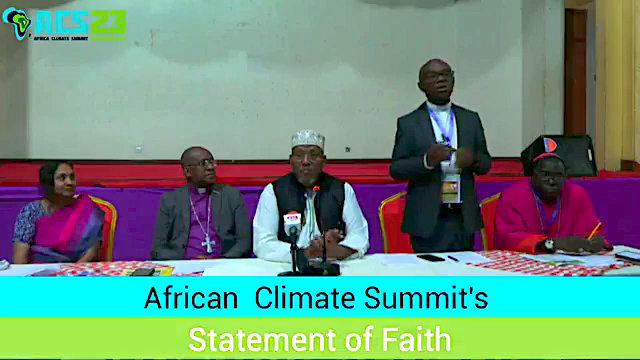KENYA: “Demonstrate Solidarity to Safeguard the Earth,” Africa’s Faith leaders to World Partners on Climate Change

Faith Leaders Representatives. Credit Courtesy Photo
Sr. Jecinter Antoinette Okoth, FSSA
During the African Climate Summit (ACS) and the African Climate Week (ACW), in Kenya’s capital Nairobi, from 4th–6th September, faith leaders from around the African continent have called upon the Kenyan government, the African Union (AU) and the United Nations Framework Convention (UNFC) on Climate Change to take the opportunity of the summit and resolve to safeguard the earth which is for all people.
In their statement published Wednesday, September 6, representatives from various faith organizations including GreenFaith Africa, Tearfund, ACT Alliance, Christian Aid, Lift Humanity Foundation (LHF), Supreme Council of Kenya Muslims (Supkem) Nairobi, Hindu Council of Kenya, Jesuit Centre for Ecology and Development, and All Africa Conference of Churches (ACC) said that “Africa Climate Summit and the African Climate Week is a timely moment for leaders to move beyond rhetoric, demonstrate our collective resolve and unwavering solidarity to safeguard the earth for current and future generations.”
They noted that their aim of joining the Africa Climate Summit and Week as representatives of diverse and united voices of African multi-faith leaders is for “a shared conviction and a solemn responsibility,” cognizant that the world is currently at “crossroads in history and a moment of unprecedented challenge where the very fabric of creation is threatened by the heedless actions of humanity and the quest to profit from creation,” calling for the need of solidarity.
According to the faith leaders, anytime climate disasters strike, it is normally, the faithful who respond with open hearts and helping hands and the churches, mosques and temples “become safe havens and new homes for the displaced.”
They decry lack of urgency to care for creation and call on all actors to listen to the cry of the poor and cry of the earth saying, “As guardians of spiritual wisdom and moral guidance we are disheartened by how actions to tackle climate change fall short of the required urgent ambition. This is the time for more ambitious political leaders, communities and ourselves must heed the cries of the earth and the loud cries of those most affected by its changing climate.”
They added, “Our sacred teachings demand that we be responsible for creation. The values of stewardship, empathy, justice, equity and solidarity as enshrined in our faith traditions must guide every decision and action that is taken at the Africa Climate Summit and Week.”
Based on the aforementioned concerns, the Faith leaders urged the governments and participants who were at the ACS and ACW to be guided by the wisdom of faith traditions and the undeniable urgency of the moment.
“The faith constituency is deeply concerned by actions that fall short of the required ambition in tackling the climate emergency which threatens life on earth. We must leverage this momentum to deliver concrete actions that will help the continent address the challenges of the climate crisis,” reads part of the Wednesday statement as it continues, “It is now more than ever before that our governments must prioritize policies that honour our planet and its biodiversity, that promote sustainable land practices, that mitigate the effects of climate change on the most vulnerable among us, and that deliver adequate and predictable climate finance to where it is most needed.”
Highlighting some of the concerns key to the African region that must be considered, the Faith representatives said that concerning climate financing, “International community need to meet up its financial obligations to Africa and African leaders must become more transparent in the judicious use of their resources towards improving the quality of lives of their citizens.”
Aware that there has not been adequate financial support directed to the African continent despite efforts and commitments from the developed countries to avail the same, they said, African leaders must take steps to reverse the haemorrhaging of financial resources from the continent to the western world,” since “the African Climate Summit presents an opportunity for developed countries, who have contributed the most to the climate crisis, to move beyond rhetoric and deliver on the long due finance.”
On this concern, the faith leaders, called upon all actors, including societal leaders, and citizens of the world to “put pressure on states and financial institutions, particularly those that determine the rules of engagement within the global financial architecture, to urgently re-purpose the architecture.”
“This architecture must be equitable to all, foster low carbon climate resilient growth, release fair and affordable forms of finance and support green and inclusive growth,” they narrated adding that “Global North leaders need to move past announcements, to delivery on commitments made.”
They therefore urged all African leaders to adopt a roadmap of ensuring that climate finance is delivered and reaches the most vulnerable and marginalised frontline communities that are at the highest risk of the climate crisis.
Other areas which need consideration according to the African faith leaders include need to address loss and damage, youth and green jobs, adaptation, fossil fuel phase out and supporting renewable energy access, agriculture, food security and sovereignty.


